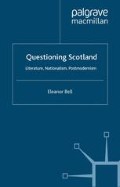Abstract
Irish history emerges as the author of Irish writing, rather than vice versa, whether vice versa signifies the aesthetic or the post-structuralist. Further, history itself is constructed within a specific historical strand of Nationalist discourse — Republican as opposed to Home Rule.1
Access this chapter
Tax calculation will be finalised at checkout
Purchases are for personal use only
Preview
Unable to display preview. Download preview PDF.
Notes
Edna Longley, The Living Stream: Literature and Revisionism in Ireland (Newcastle upon Tyne: Bloodaxe, 1994), (p27).
Richard Kearney, Postnationalist Ireland: Politics, Culture, Philosophy (London: Routledge, 1997), (p.2).
For a discussion of ‘strategic essentialism’ see Spivak’s The Post-Colonial Critic: Interviews, Strategies, Dialogues (London and New York: Routledge, 1990).
Gerry Smyth, ‘Irish Studies, Postcolonial Theory and the “New” Essentialism’, Irish Studies Review, Vol. 7, No.2 (1999), pp.211–220, (p.212).
To be unhomed is not to be homeless, nor can the unhomely be easily accommodated in that familiar division of the social life into private and the public spheres… In that displacement, the border between home and world becomes confused; and, uncannily, the private and the public become part of each other, forcing upon us a vision that is as divided as it is disorienting… In the stirrings of the unhomely, another world becomes visible. It has less to do with forcible eviction and more to do with the uncanny literary and social effects of enforced social accommodation or historical migrations and cultural relocations… The unhomely is the shock of recognition of the world-in-thehome, the home-in-the-world.’ Homi K. Bhabha, ‘The World and the Home’ in McClintock, Mufti and Shohat (eds.) Dangerous Liaisons: Gender, Nation and Postcolonial Perspectives (London and Minneapolis: University of Minnesota Press, 1997), pp.445–455, (p.445).
Copyright information
© 2004 Eleanor Bell
About this chapter
Cite this chapter
Bell, E. (2004). Introduction. In: Questioning Scotland. Palgrave Macmillan, London. https://doi.org/10.1057/9780230508248_1
Download citation
DOI: https://doi.org/10.1057/9780230508248_1
Publisher Name: Palgrave Macmillan, London
Print ISBN: 978-1-349-51183-9
Online ISBN: 978-0-230-50824-8
eBook Packages: Palgrave Literature & Performing Arts CollectionLiterature, Cultural and Media Studies (R0)

